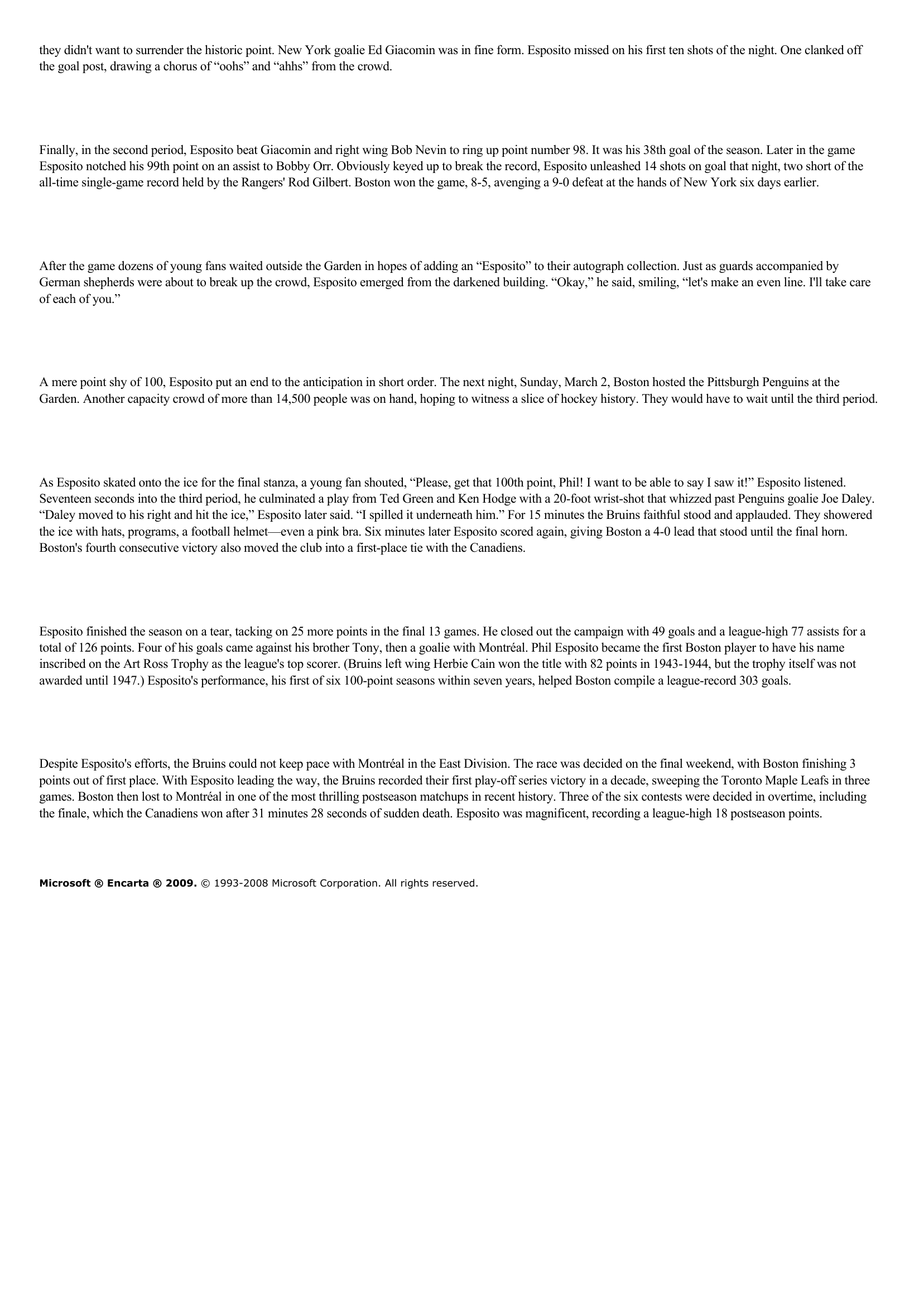Esposito Scores 100 Points.
Publié le 14/05/2013

Extrait du document
«
they didn't want to surrender the historic point.
New York goalie Ed Giacomin was in fine form.
Esposito missed on his first ten shots of the night.
One clanked offthe goal post, drawing a chorus of “oohs” and “ahhs” from the crowd.
Finally, in the second period, Esposito beat Giacomin and right wing Bob Nevin to ring up point number 98.
It was his 38th goal of the season.
Later in the gameEsposito notched his 99th point on an assist to Bobby Orr.
Obviously keyed up to break the record, Esposito unleashed 14 shots on goal that night, two short of theall-time single-game record held by the Rangers' Rod Gilbert.
Boston won the game, 8-5, avenging a 9-0 defeat at the hands of New York six days earlier.
After the game dozens of young fans waited outside the Garden in hopes of adding an “Esposito” to their autograph collection.
Just as guards accompanied byGerman shepherds were about to break up the crowd, Esposito emerged from the darkened building.
“Okay,” he said, smiling, “let's make an even line.
I'll take careof each of you.”
A mere point shy of 100, Esposito put an end to the anticipation in short order.
The next night, Sunday, March 2, Boston hosted the Pittsburgh Penguins at theGarden.
Another capacity crowd of more than 14,500 people was on hand, hoping to witness a slice of hockey history.
They would have to wait until the third period.
As Esposito skated onto the ice for the final stanza, a young fan shouted, “Please, get that 100th point, Phil! I want to be able to say I saw it!” Esposito listened.Seventeen seconds into the third period, he culminated a play from Ted Green and Ken Hodge with a 20-foot wrist-shot that whizzed past Penguins goalie Joe Daley.“Daley moved to his right and hit the ice,” Esposito later said.
“I spilled it underneath him.” For 15 minutes the Bruins faithful stood and applauded.
They showeredthe ice with hats, programs, a football helmet—even a pink bra.
Six minutes later Esposito scored again, giving Boston a 4-0 lead that stood until the final horn.Boston's fourth consecutive victory also moved the club into a first-place tie with the Canadiens.
Esposito finished the season on a tear, tacking on 25 more points in the final 13 games.
He closed out the campaign with 49 goals and a league-high 77 assists for atotal of 126 points.
Four of his goals came against his brother Tony, then a goalie with Montréal.
Phil Esposito became the first Boston player to have his nameinscribed on the Art Ross Trophy as the league's top scorer.
(Bruins left wing Herbie Cain won the title with 82 points in 1943-1944, but the trophy itself was notawarded until 1947.) Esposito's performance, his first of six 100-point seasons within seven years, helped Boston compile a league-record 303 goals.
Despite Esposito's efforts, the Bruins could not keep pace with Montréal in the East Division.
The race was decided on the final weekend, with Boston finishing 3points out of first place.
With Esposito leading the way, the Bruins recorded their first play-off series victory in a decade, sweeping the Toronto Maple Leafs in threegames.
Boston then lost to Montréal in one of the most thrilling postseason matchups in recent history.
Three of the six contests were decided in overtime, includingthe finale, which the Canadiens won after 31 minutes 28 seconds of sudden death.
Esposito was magnificent, recording a league-high 18 postseason points.
Microsoft ® Encarta ® 2009. © 1993-2008 Microsoft Corporation.
All rights reserved..
»
↓↓↓ APERÇU DU DOCUMENT ↓↓↓
Liens utiles
- Lemieux Scores Eight Points.
- Les points de vue dans la narration
- Grammaire La ponctuation Recopie ce texte en plaçant les points et les majuscules.
- Mathématiques La moitié 10 100 254 1 La moitié de 254 c'est 127 car 127 +127= 254 1 000 60 Mathématiques 1000 127 50 La
- Mathématiques En plus / en moins Utilise la technique que tu veux pour dire combien il y a d'objets NOIRS en plus dans chaque ligne 25 18 45 36 60 53 100 76 100 48 Mathématiques COMBIEN?


